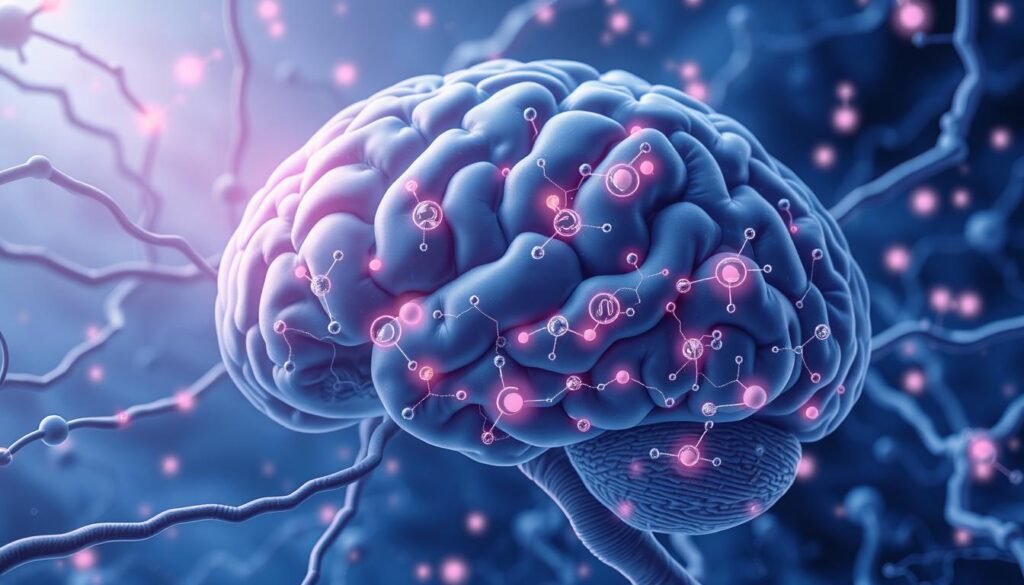About one in five adults in the United States struggle with insomnia. This growing health issue shows we need better treatments. Tricyclic antidepressants (TCAs) are getting noticed for this. Though they were made for depression, they help with sleep disorders too. They offer hope to those who find it hard to sleep at night.
This guide will take you through the world of tricyclic antidepressants for sleep disorders. We’ll see how these meds can help with insomnia, make sleep better, and talk about their benefits and side effects. You’ll learn how they work on brain chemicals, which TCAs are most used, and how much to take. If you’re looking into other ways to treat sleeplessness, this article is for you. Let’s explore what science says and what to think about when using tricyclic antidepressants for sleep issues.
Key Takeaways
- Insomnia affects nearly 20% of adults in the U.S.
- Tricyclic antidepressants can be effective in managing insomnia symptoms.
- Common TCAs include Amitriptyline and Doxepin.
- While useful, TCAs have potential side effects that need consideration.
- Improved sleep quality can change overall health and well-being significantly.
- Further research is needed to bolster the evidence for TCAs in insomnia treatment.
Understanding Insomnia and Its Impact
Insomnia is a common sleep disorder affecting how you function daily and your mental health. It’s important to know how it affects lives to manage and treat it properly.
Definition of Insomnia
Insomnia means you’re not getting enough good sleep. It comes in different forms like trouble falling asleep, waking up often, or getting up too early. These problems can make daily life tough.
Symptoms and Challenges of Insomnia
People with insomnia might feel very tired during the day. They may also get irritable or anxious and find it hard to focus. These symptoms are important to treat. If not, insomnia can lead to worse problems like depression, anxiety, and poorer mental health overall.
Co-occurring Conditions with Insomnia
Insomnia often happens along with other mental health issues. This can make treating it more complex. Conditions like anxiety, depression, and substance abuse might appear with sleep problems. Doctors need to understand this to help their patients fully.
What Are Tricyclic Antidepressants?
Tricyclic antidepressants, known as TCAs, started in the 1950s. They were meant to help with major depression. Today, they do more than that by affecting certain brain chemicals.
History and Development
In 1959, TCAs brought a new hope for mental health care. They were some of the first depression fighters. Today, drugs like Amitriptyline and Doxepin are still used, especially when SSRIs don’t work. Studies say TCAs are good but can have more side effects.
Common Types of Tricyclic Antidepressants
There are many TCAs, each different in its way. Here’s a list of some top ones:
| TCA Name | Primary Use | Key Considerations |
|---|---|---|
| Amitriptyline | Depression, Pain Management | Causes drowsiness, caution in heart conditions |
| Doxepin | Insomnia, Depression | May cause sedation, monitor for severe side effects |
| Nortriptyline | Depression, Chronic Pain | Better tolerated, lower side effects than others |

It’s essential for doctors to know each TCA well. Research on TCAs shows they help when other meds don’t. But, doctors must be aware of the side effects and each patient’s health.
How Do Tricyclic Antidepressants Work?
Tricyclic antidepressants (TCAs) are key in treating sleep disorders. They work by changing brain chemistry. Knowing how they alter neurotransmitter levels helps us understand their effect on sleep issues related to depression.
Mechanism of Action on Neurotransmitters
TCAs mainly stop the reuptake of two important neurotransmitters: serotonin and norepinephrine. This increases their levels in the brain, which improves mood and fights depression’s symptoms. They also affect sleep by changing neurotransmitter activity. To learn more about how antidepressants influence sleep, check out this article.
Effects on Sleep Physiology
TCAs can make sleep better by reducing REM sleep phases. Less REM sleep helps in fixing sleep issues. Some TCAs also have sedative properties. These can make sleep more continuous with fewer wake-ups. This is especially good for those with insomnia and depression.
Drugs like trazodone and mirtazapine work well for sleep problems too. They avoid causing daytime sleepiness. This makes them good alternatives for people looking for help with sleep.

| Antidepressant Class | Mechanism | Effects on Sleep | Notes |
|---|---|---|---|
| TCAs | Block reuptake of serotonin and norepinephrine | Reduce REM sleep; improve sleep continuity | Effective for sleep issues in depression |
| SSRIs | Inhibit serotonin reuptake | Increased sleep onset latency; more awakenings | Not optimal for individuals with sleep disorders |
| SNRIs | Impact both serotonin and norepinephrine levels | Similar to SSRIs with added effects on sleep | May take time to show their effectiveness |
| Atypical Antidepressants | Various mechanisms | Can enhance total sleep time; reduce latency | Examples include trazodone and mirtazapine |
Tricyclic Antidepressants for Sleep Disorders
Tricyclic antidepressants, or TCAs, are now seen as a good choice for treating insomnia. They were originally for depression but also help improve sleep. This makes them useful for those with ongoing sleep issues.
Usage in Treating Insomnia
Doxepin, also known by the brand name Silenor, is often given to people who have trouble sleeping. It’s taken about 30 minutes before bed. Patients are advised to stay in bed for 7 to 8 hours after taking it.
Most people see better sleep within a few days. If there’s no improvement in a week or so, they should talk to their doctor.
Commonly Prescribed Tricyclic Antidepressants
Doxepin is a top choice for sleep problems, even though it’s not officially approved by the FDA for this use. Doctors prefer it especially when other sleep aids don’t work or are risky.
Off-Label Prescriptions in Sleep Disorder Management
Doctors often prescribe TCAs like Doxepin for sleep issues in ways not specifically approved by FDA guidelines. This strategy helps them provide better, long-term care without the side effects of usual sleep drugs. It shows how important TCAs have become in treating severe insomnia effectively.

Benefits of Using Tricyclic Antidepressants for Sleep Issues
Tricyclic antidepressants (TCAs) offer a hope for those struggling with sleep issues. They have significant sedative effects which improve sleep quality. They are compared with other sleep medications to help people choose the best treatment.
Sedative Effects and Improved Sleep Quality
These medicines can help you sleep better. People often notice their sleep improves after using TCAs. They work by keeping certain brain chemicals balanced, leading to better sleep.
Comparative Effectiveness Against Other Sleep Medications
TCAs have unique benefits compared to other sleep aids. Though some new medicines may have fewer side effects, TCAs are great for those with sleep and depressive issues. They have shown to improve sleep quality better than placebo.
| Medication Type | Sedative Effects | Risk of Dependence | Onset of Action |
|---|---|---|---|
| Tricyclic Antidepressants | Significant | Moderate | 6-8 weeks |
| SSRIs | Low | Low | 2-3 weeks |
| Benzodiazepines | High | High | Immediate |
| Natural Sleep Aids | Varied | Low | Varied |
TCAs are known for having a lower risk of addiction. This makes them a safe choice for some. Patients with severe insomnia might find relief with TCAs. Knowing these advantages helps individuals confidently address their sleep problems.
Side Effects of Tricyclic Antidepressants
Tricyclic antidepressants (TCAs) are used to treat sleep problems but have side effects. Knowing these side effects and their long-term impacts is key for safe treatment.
Common Side Effects
Starting TCAs can lead to side effects like:
- Dry mouth
- Constipation
- Drowsiness
- Weight gain
- Dizziness
These side effects usually get better as your body gets used to the medicine. But, some people might have serious issues like serotonin syndrome. This problem can cause confusion and an irregular heartbeat, needing urgent care.
Long-Term Safety Considerations
Using TCAs for a long time needs careful watching because of safety risks. Some risks include:
- Getting type 2 diabetes from weight gain
- Hyponatraemia in older adults, causing complications
- A higher chance of heart disease, shown in research
Young people might also risk harmful thoughts, stressing the need for regular doctor visits. These visits should happen every 2 to 4 weeks at first. They help check how well the medicine works and watch out for bad effects.
| Side Effect | Frequency |
|---|---|
| Dry mouth | Common |
| Constipation | Common |
| Drowsiness | Common |
| Weight gain | Common |
| Dizziness | Common |
| Serotonin syndrome | Rare |
| Hyponatraemia | Potential in elderly |
| Increased risk of heart disease | Observed in studies |
Dosage Guidelines for Tricyclic Antidepressants
It’s vital to follow the right dosage rules when giving out tricyclic antidepressants (TCAs). This ensures the treatment works well and reduces side effects. Knowing where to start with dosages helps doctors see how patients react. This is important when considering how sleepy a patient might feel during the day.
Initial Dosing Recommendations
Starting doses of TCAs are kept low to see how each person reacts. For sleep problems, amitriptyline doses range from 10 to 50 mg. This is much lower than what’s given for major depression, which is 100 to 300 mg. Doxepin, another TCA for sleep, has even lower doses of 3-6 mg. This is approved by the FDA.
Adjustments Based on Individual Response
Dosing adjustments depend on how patients respond and any side effects. Watching how patients handle the medication at first is critical. If things look good, doses can slowly go up to make the treatment better. The plan needs to fit the person’s health, other medicines they take, and how well they handle the treatment. This helps keep side effects low while making the treatment work better.
Considerations for Selecting Tricyclic Antidepressants
Choosing the right tricyclic antidepressant (TCA) is key. It requires looking at a patient’s health closely to get the best results. It’s important to understand a patient’s health. Every patient is different, so individual checks are crucial. This helps avoid risks that come with using TCAs.
Evaluating Patient Health Conditions
Healthcare providers must check the patient’s health before prescribing a TCA. This step helps prevent harm to the patient’s health. Some people have other health issues that affect which antidepressant is the best choice. For example, people with depression and trouble sleeping might do well with sedative TCAs like amitriptyline. This drug is notably effective, with research backing its benefits.
Drug Interactions and Risks
Prescribing tricyclic antidepressants requires caution about drug interactions. These drugs can react badly with others, especially those affecting serotonin. It’s vital to review what medicines a patient already takes. This minimizes the risk of problems like serotonin syndrome. Patients should feel free to talk about their meds. Knowing the risks of TCAs, like drowsiness and withdrawal, helps in managing them better.
To pick the right TCA, healthcare workers must understand how patient health and drug interactions mix. Careful evaluation improves sticking to treatment and patient outcomes. For more info on how some meds affect sleep and handling patients, click here.
Conclusion
Tricyclic antidepressants (TCAs) are key in treating sleep problems like insomnia. Many people with chronic pain also have trouble sleeping. This links pain and sleep issues closely. TCAs, for example, amitriptyline, improve sleep and help with pain.
TCAs like amitriptyline improve sleep, especially in scientific studies. But it’s important to watch for side effects. Up to 90% of depressed patients suffer from insomnia. A personalized treatment plan is essential.
New studies show how antidepressants affect sleep. It’s a balance of risks and benefits. Refining how TCAs are used in treatment is crucial. To understand more about antidepressants and sleep, please refer to the published literature.